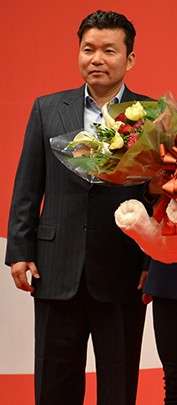Hwang Young-cho
 | |||||||||||||||||||
| Personal information | |||||||||||||||||||
|---|---|---|---|---|---|---|---|---|---|---|---|---|---|---|---|---|---|---|---|
| Born |
22 March 1970 Samcheok, Gangwon-do, South Korea | ||||||||||||||||||
Medal record
| |||||||||||||||||||
Hwang Young-cho (Hangul: 황영조, Hanja: 黃永祚; born 22 March 1970) is a former South Korean athlete, winner of the marathon race at the 1992 Summer Olympics and 1994 Asian Games.
Career
Born in Samcheok, South Korea, Hwang was a promising track athlete in his junior years, but after his first marathon in 1991, which he won, decided to specialize to marathon.
The Barcelona Olympic marathon was only fourth of his career. He had won two and placed second on his three previous marathon competitions. In Barcelona, Hwang was in the leading pack from the start, but in a slowly run race, this group still numbered thirty runners at the halfway mark. However, runners gradually lost contact with the leaders in the second half of the race, until at 35 km, only Hwang and Kōichi Morishita from Japan remained. They had quite a memorable struggle, until Hwang broke free after 40 km to win a gold medal.
Hwang raced sparingly after Barcelona, and he retired after injury prevented him from representing South Korea in the 1996 Olympics.
Hwang was depicted on the 2006 Berlin Marathon medal to commemorate his victory in the 1992 Olympic marathon event.
South Koreans' Olympic marathon medals
Hwang has been one of two Korean athletes to win the Olympic marathon. The other winner was Sohn Kee-chung. Hwang's contemporary South Korean athlete Lee Bong-Ju won the silver medal in the marathon at the 1996 Summer Olympics held in Atlanta, and Nam Sung-yong won the bronze medal at the 1936 Summer Olympics in Berlin at the same race that Sohn Kee-chung won.
Achievements
- 1991
- Summer Universiade, winner of the men's marathon in Sheffield.
- 1992
- Summer Olympics, winner of the men's marathon in Barcelona.
- 1994
- Asian Games, winner of the men's marathon in Hiroshima.
- Boston Marathon, fourth place in a new Korean record (2:08:09)